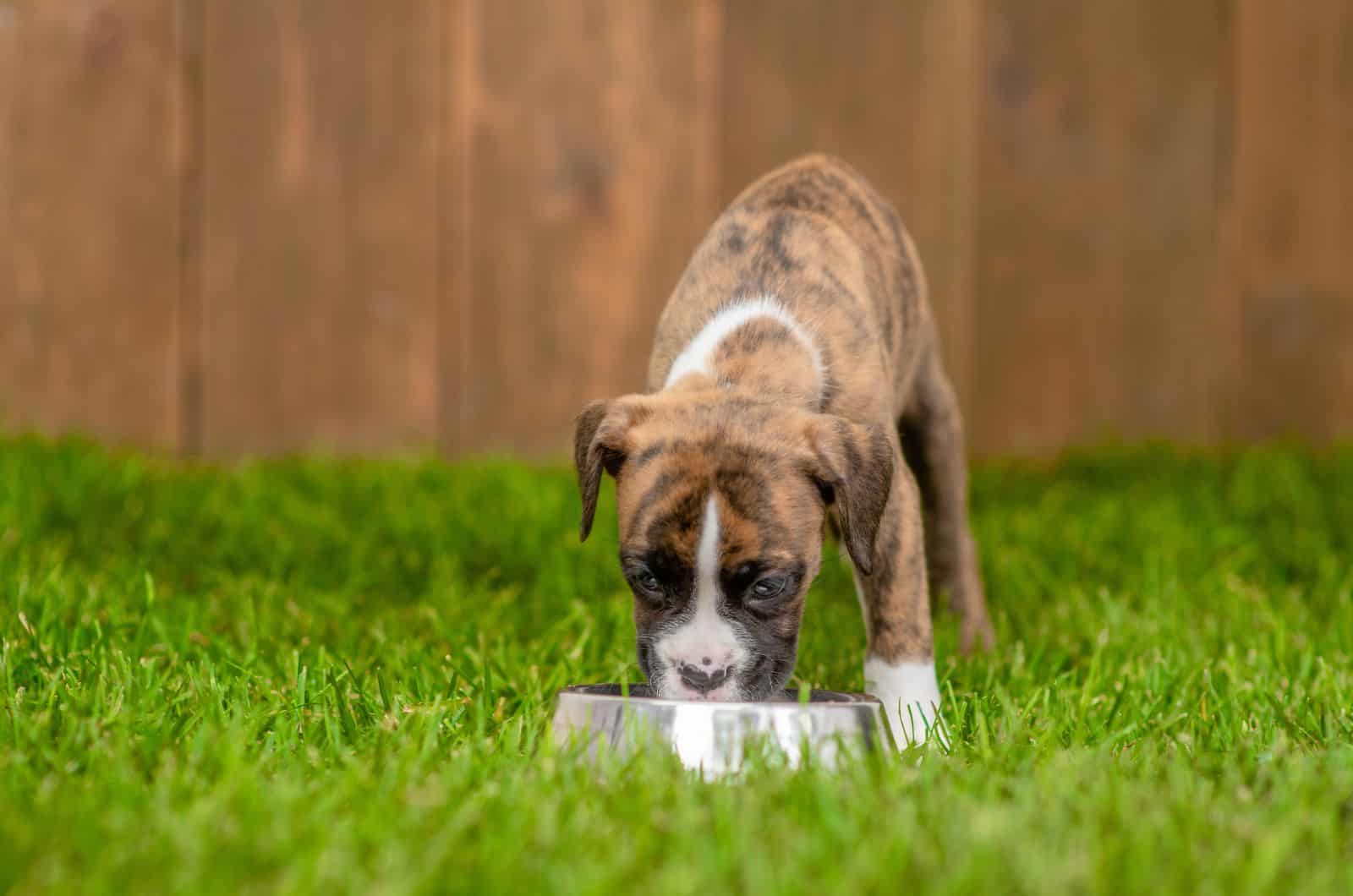If Boxer dogs are your favorite four-legged companions and you want to know more about their diet, then you are on the right place.
We have prepared a detailed Boxer feeding chart to provide you with all the necessary information about dietary needs of these lovely pooches.
In order to grow into healthy dogs, Boxer puppies need to eat high-quality dog food. But, there is so much more to a healthy Boxer diet.
Besides just buying dog food, Boxer breeders and owners must pay a lot of attention to puppy feeding schedules, Boxer’s sensitive stomachs, weight gain, and the overall health status of their Boxer pup.
This Boxer feeding chart focuses on explaining the difference between certain Boxer dog food types, what the right amount of food for Boxers is, which foods are good for Boxers and which are not, as well as many more interesting feeding information.
Boxer Feeding Chart Review
First let’s talk about adult dogs — male and female Boxers that are over eighteen months old. The Boxer growth chart explains that eighteen months of age is when these medium-sized dogs reach their full weight and height.
How much an adult Boxer dog eats depends on its weight, so here’s a quick chart:
[table id=531 /]
Although this Boxer feeding chart looks simple and easy to follow, there is more to Boxer feeding than just “four cups a day”.
We are going to talk more about what kind of food the Boxer needs and how much food is too much (and too little!).
Boxer Puppy Feeding Chart
To make it short and simple, we are going to write down a Boxer puppy feeding chart. This chart is written according to Royal Canin dry kibble for Boxer dogs.
[table id=532 /]
Boxer Puppy Feeding Schedule
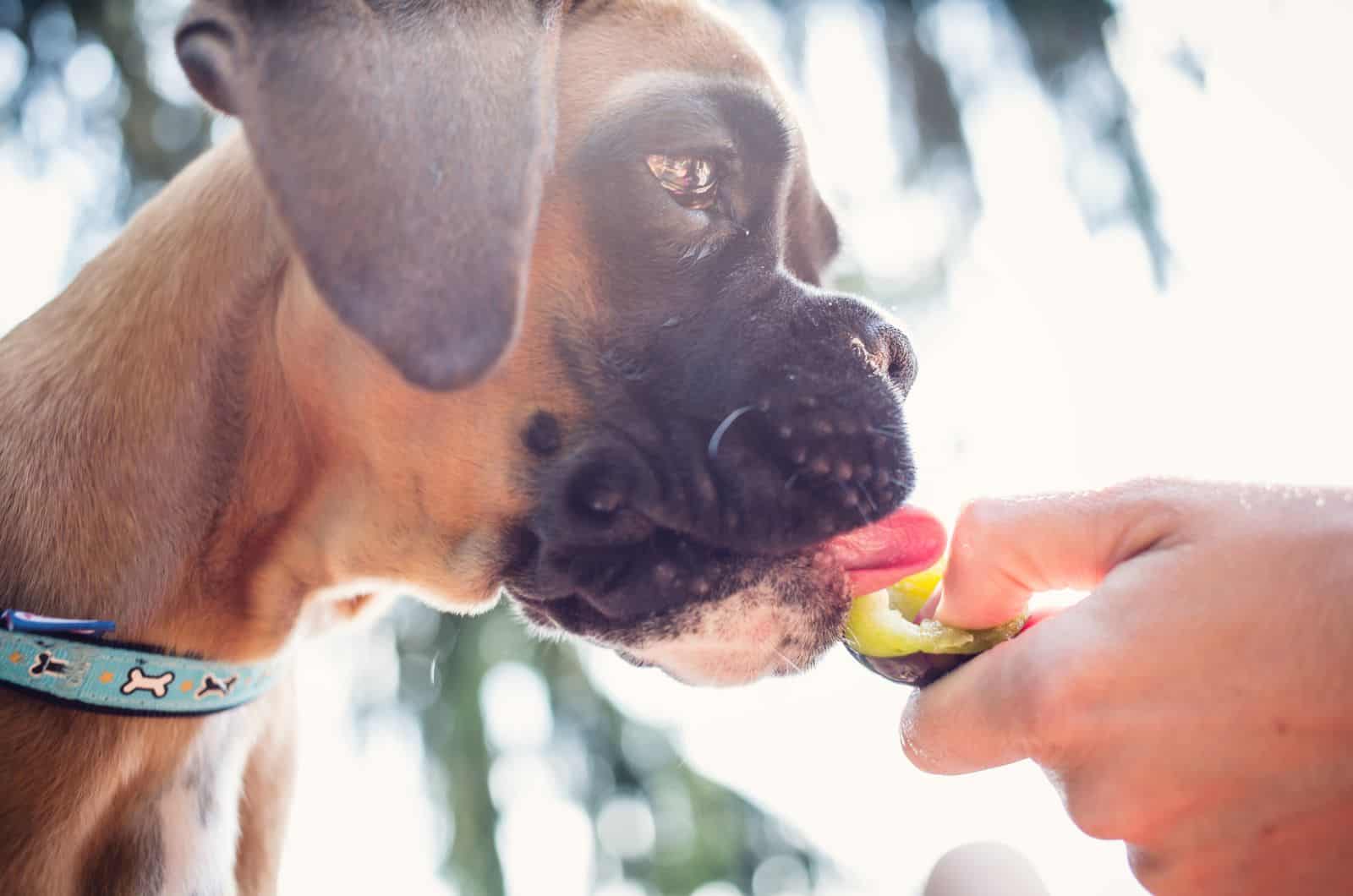
When it comes to food, Boxer puppies require a healthy diet. Besides a nutritious diet, Boxer owners must know the right time to feed their pups.
Boxer puppy feeding schedule is made easy with this Boxer feeding chart. Below you can follow the Boxer puppy’s development from two weeks of age until twelve months of age.
Two To Three Week Old Boxer Puppy
From the moment they are born, Boxer puppies fight for food — sibling rivalry at its finest. Larger and stronger Boxer pups push their weaker siblings aside to get the most food. This is why many Boxer breeders and owners make sure that all puppies get enough food.
Two week old tiny Boxer puppies are new to this world and rely completely on the Boxer mother. They should always stay with their mother because her breast milk is their main and only source of nutritious food.
During this period, two week old Boxer puppies open their eyes for the first time. However, they are still dependent on the Boxer mommy. Even though they are double the size at three weeks of age, Boxer pups are still nursing.
Four To Six Week Old Boxer Puppy
By the end of the third week, Boxer puppies start to grow their baby teeth. During the period between four to six weeks, their teeth grow bigger and the Boxer mommy will wean them off soon.
At four weeks of age, the Boxer mother starts weaning her puppies. This means that you will want to help your Boxer puppies transition from momma’s milk to puppy food.
To help the Boxer puppy transition from milk to store-bought puppy food, it is time that you try making puppy mush. You can mix 1/4 puppy food with 3/4 lukewarm water. Try offering your Boxer pup this mixture up to four times per day but make sure not to overfeed it.
Too much puppy mush can cause your Boxer pup loose stools and diarrhea.
By the end of the sixth week, you will want to reduce liquid in your Boxer puppy’s diet, so that it can easily transition to dry dog food.
Seven To Nine Week Old Boxer Puppy
This is the perfect period for Boxer puppies to get used to commercial dog food (puppy food) completely. However, most Boxer puppies will need some time to fully get used to their new diet. That said, you will need to soften the puppy food that your seven week old Boxer puppy is eating.
You should give your Boxer puppies high-quality food three to four times a day. Boxer puppies at this age love to eat, so make sure not to overfeed them (two cups per day).
At eight weeks of age, your Boxer puppy should be completely weaned from its mother’s milk.
In fact, Boxer puppies that are eight weeks old are ready to go to their new homes, that’s how independent they are!
This means that your Boxer puppy is totally ready for proper mealtime! The feeding schedule should include: breakfast, lunch, and dinner.
They will also have more energy, which may necessitate consuming more calories or eating larger portions.
Ten To Twelve Week Old Boxer Puppy
At ten weeks of age, your Boxer puppy is more energetic than ever! Its little body needs all the nutrients from high quality food it can get. At this point, your Boxer puppy eats twice the amount of food an adult Boxer dog would eat. But, the puppy needs puppy food, so don’t introduce it to adult dog food yet.
Even though your eleven week old Boxer puppy has an enormous appetite, you must not leave food to its own will. So, every time it is done eating, you should pick up the leftover dog food.
Four To Six Month Old Boxer Puppy
As a rule of thumb, you should feed your four month old Boxer puppy 4 – 5⅛ cups per day. Make sure to separate the amount of food in 3 to 4 smaller portions through the day.
At six months of age, the Boxer puppy is growing rapidly and you might want to consider home-cooked dog food or introducing it to a raw diet.
High-quality commercial dog food is packed with necessary nutrients, but nothing can replace a good home-cooked meal!
Seven To Twelve Month Old Boxer Puppy
At seven months of age, the Boxer puppy is almost all grown up! We’re almost there!
The period between seven to twelve months of age is when you will want to give your Boxer puppy less food than you would feed a 5 month old Boxer.
So, about 3⅜ to 4¼ cups per day will do the trick. At twelve months of age, Boxer puppies will do well with two meals per day. At this point, you should start incorporating adult food into your Boxer puppy’s diet.
However, this depends on the health state and development of your Boxer puppy. If the Boxer pup is more on the skinny side, then you should feed it more food than described in feeding charts.
Just make sure to ask your vet to help you develop a balanced diet for your Boxer pup.
Adult Boxer Dog Weight
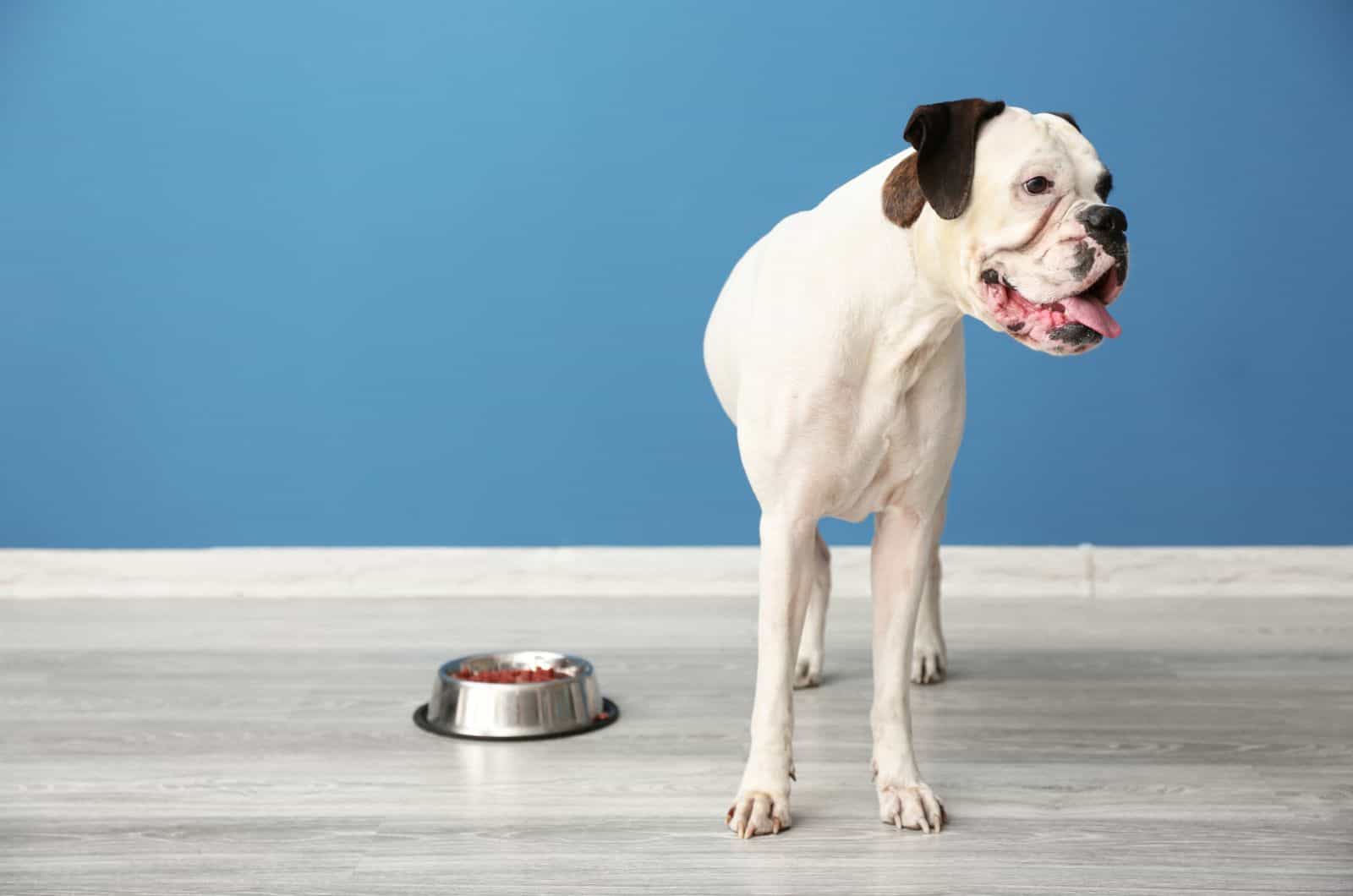
In order to establish a healthy diet, Boxer owners must know their dog’s weight.
Fully grown male adult Boxer dogs reach between 65 to 80 pounds, whereas adult female Boxer dogs weigh a bit less, reaching anywhere from 50 to 65 pounds.
Adult Boxer dogs should be fed two meals per day — breakfast and dinner. The most important thing is to take away leftover dog food when your Boxer dog is done eating.
You do not want your adult Boxer to have access to food 24/7. More often than not, Boxer dogs don’t know when to stop!
Due to the fact that the Boxer dog breed is prone to bloating (a life-threatening condition), owners and breeders should be cautious around feeding them too much food.
Do Boxers Need A Lot Of Food?
If you have owned Boxers or if you are currently a proud owner of the Boxer, then you know how highly energetic these pooches are. Well, due to their high energy levels, Boxers require a lot of exercise. With frequent exercise comes heavy calorie burning after which your Boxer dog needs more food!
Besides high energy levels, Boxer dogs are medium breed dogs that inherit faster metabolism than an average medium-sized dog.
That said, Boxer dogs require food that is rich in calories and nutrients to make up for the energy that they use during the day.
The best Boxer food will be one that is made for active dogs and includes all the vitamins and minerals they require to stay healthy and fit.
How Many Times A Day Should A Boxer Eat?
Young Boxer puppies should eat more than a cup per day, while older Boxer puppies can consume up to three cups daily because their nutritional needs are higher.
Adult Boxers require about 40 fewer calories per pound of body weight than puppies. That said, daily food intake for adult Boxer dogs typically ranges from 3 to 5 cups, depending on their weight.
Adult Boxer dogs should be fed twice a day, while Boxer puppies must be fed 3 to 4 meals per day.
What Is A Good Diet For A Boxer?
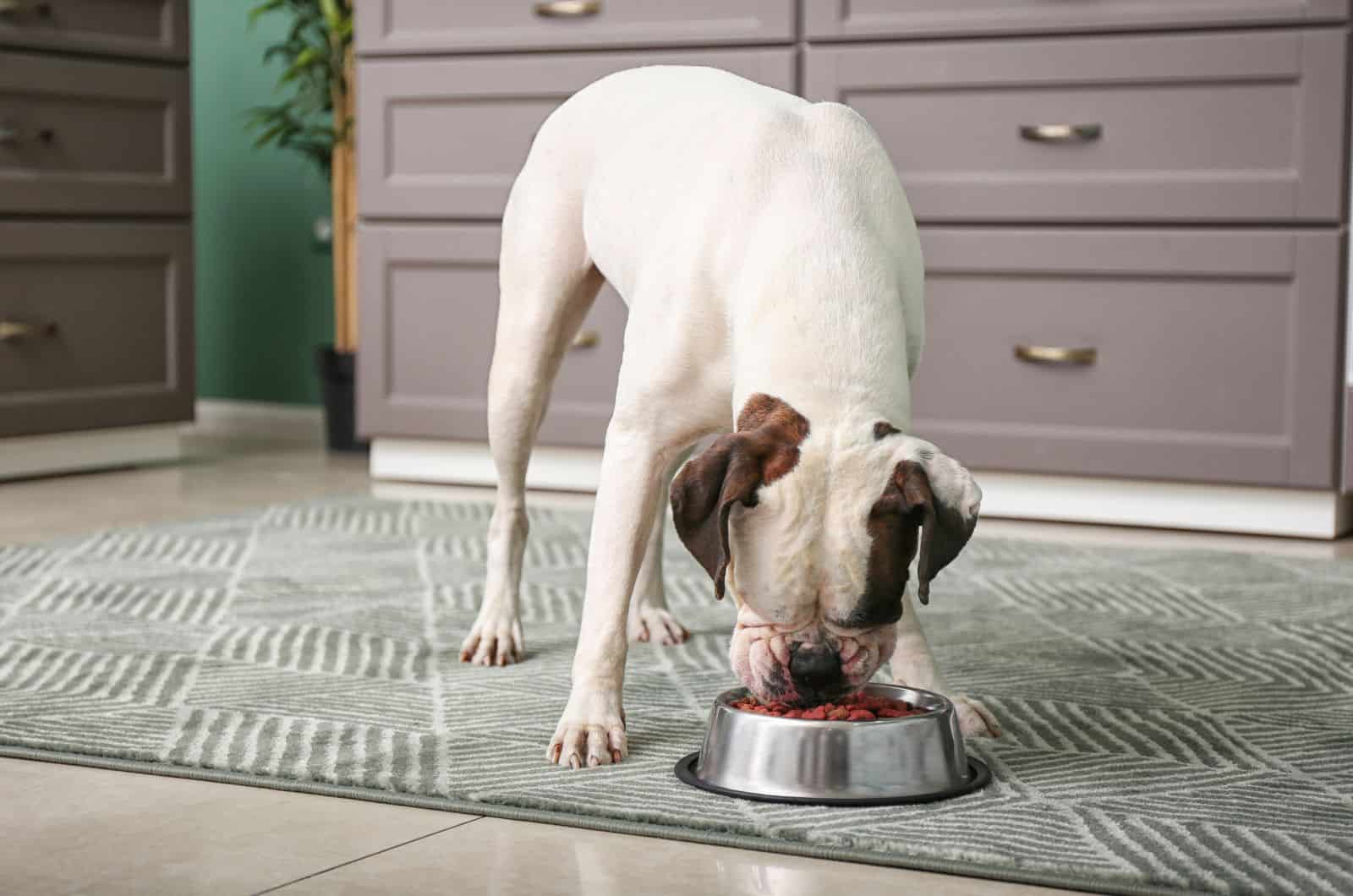
All dog breeds require basic ingredients in dog food such as protein, carbs, fatty acids, vitamins, and minerals. But the Boxer dog breed is a bit different. Why? Because Boxers are hyper dogs with insane energy levels!
So, a good diet for a Boxer pup must consist of basic ingredients, but you may also want to boost it with home-cooked food and supplements.
Boxer dog’s overall health can be greatly improved by feeding them a diet that is made of natural, wholesome food that is free of by-products, artificial flavors, preservatives, and additives.
These foods also promote heart health, boost energy, make coats shiny and breath fresher, improve eyesight, and even have an effect on a dog’s stool.
Versatile Diet
The Boxer needs at least 22% of protein as a puppy and 18% as an adult, more protein is usually preferable for this well-muscled breed. This is why you have to choose the best source of protein for your Boxer dog.
Poultry, beef, and seafood are excellent sources of animal protein for Boxer dogs because they are easy on their digestive system.
Fatty acids like omega-6 and omega-3 are great for your Boxer dog because they give its coat extra shine and make its skin healthier. With a proper diet that is packed with vitamins and fatty acids, Boxer coat colors become more vivid and its coat sheds less!
Fruit and veggies are also great for Boxer dogs because they are packed with vitamins and minerals which are essential for a healthy metabolism.
Dairy products like whipped cream and blue cheese should either not be given at all or given in very small amounts.
Grain-Free Diet
What makes the Boxer dog breed different from other medium-sized dogs is that they are prone to developing Gastric Dilatation-Volvulus (bloat). This means that the majority of Boxer dogs will have to go on a special diet.
Grain-free diets are usually recommended for adult Boxer dogs in order to avoid bloat and other digestive system issues. We can say that Boxer dogs have more sensitive stomachs than other dog breeds.
Boxer’s grain-free diet means the food it is taking is free from grains such as brown rice, oats, wheat, corn, and soy. Not only can these ingredients trigger canine bloat, but they can also cause food allergies.
Supplements
Sometimes a simple diet for your Boxer dog is simply not enough. Due to their rapid growth and high activity levels, Boxer dogs need to keep their joints in tip-top condition.
So, you want to search for food supplements that contain glucosamine chondroitin — compounds that are essential to joint health.
Moreover, Boxers are prone to elbow and hip dysplasia which is why these supplements are of utmost importance.
Additionally, cooking a good homemade bone broth can help boost your Boxer’s immune system in an all natural way!
Should I Feed My Boxer Wet Or Dry Food?
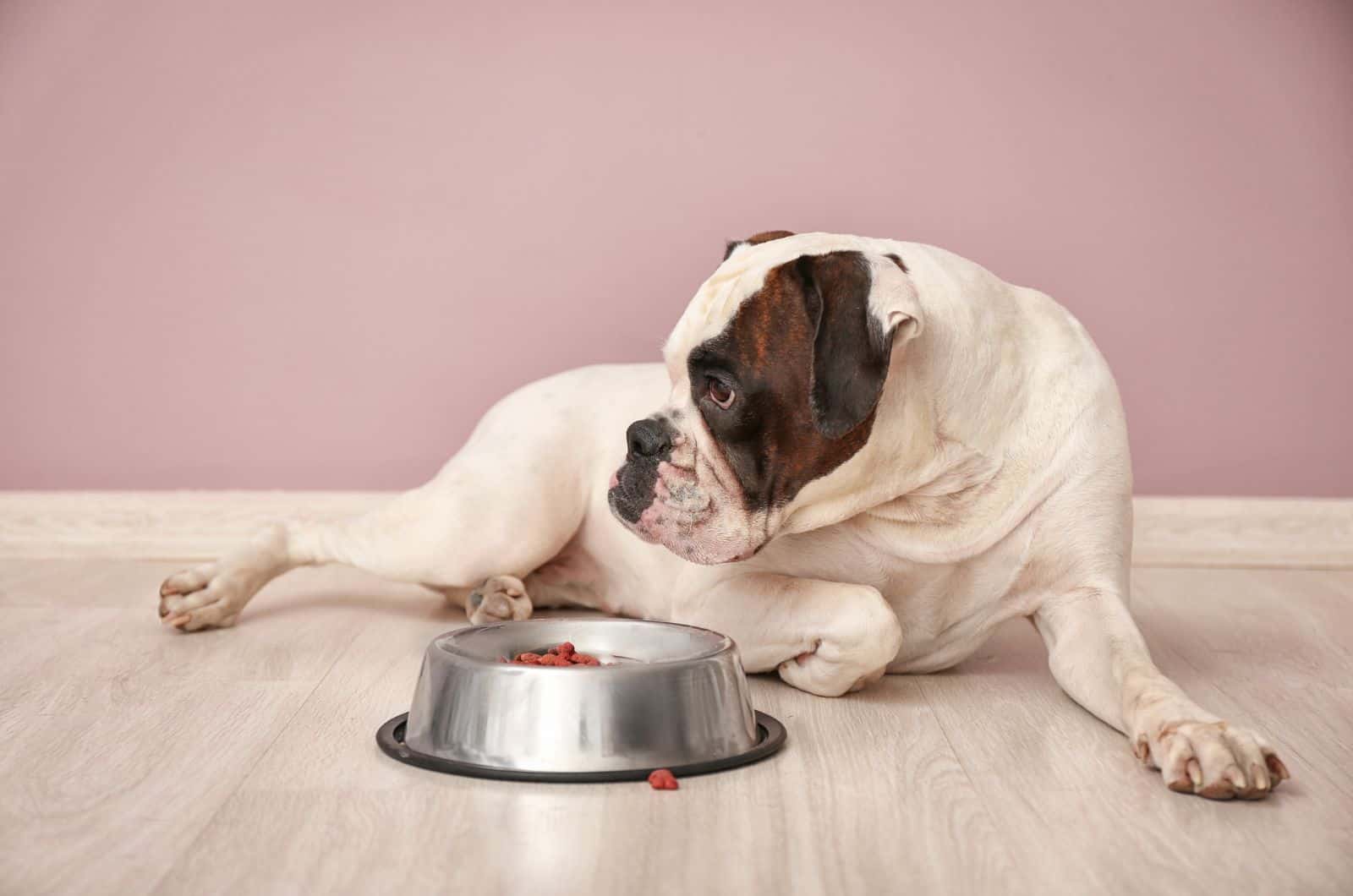
More often than not I get questions like “What should I feed my Boxer?” and “Should I feed my Boxer wet or dry food?”
For the majority of dogs in good health, mixing foods is not necessary because both wet and dry diets contain all the nutrients your furry friend needs. But, the Boxer dog breed is a bit different than the rest.
Now, I know that this is an ongoing dilemma to the majority of Boxer owners, as there is no correct answer.
That’s why we are going to tell you about the pros and cons of feeding your Boxer dog both of these food types.
Dry Dog Food
Despite the fact that many Boxers dogs may prefer wet over dry dog food, dry kibble is preferable to keep their teeth and gums healthy, and their jaw strong.
The crunch of a hard kibble will help to some extent to remove plaque, but you will still need to provide some at-home dental care.
Pure kibble diets are perfectly acceptable to give to your Boxer dog. Additionally, you can boil some chicken or give your Boxer dog some raw meat. Don’t forget the fruits and vegetables! Boxers love those!
It is perfectly fine to feed your Boxer dog a pure kibble diet. But, you will want to make it a bit more interesting by adding some dog food toppers, cooked or raw meat, fish, and vegetables.
Wet Dog Food
Wet food has more water, which keeps Boxer dogs hydrated throughout the day. That said, Boxers that feed on pure wet/canned dog food diet drink less water.
Compared to dry dog food, wet food has higher fat content which is a no-no for Boxers that are prone to canine obesity.
For most Boxer dogs that are prone to heart disease like cardiomyopathy, wet food with high fat content may be too much.
Moreover, wet dog food can change your Boxer’s teeth for the worse. Due to the fact that wet dog food is soft and mushy, Boxer dogs don’t even have to chew it. The lack of friction against your Boxer’s teeth enables the formation of plaque.
How Much Food Should I Feed My Boxer Dog?
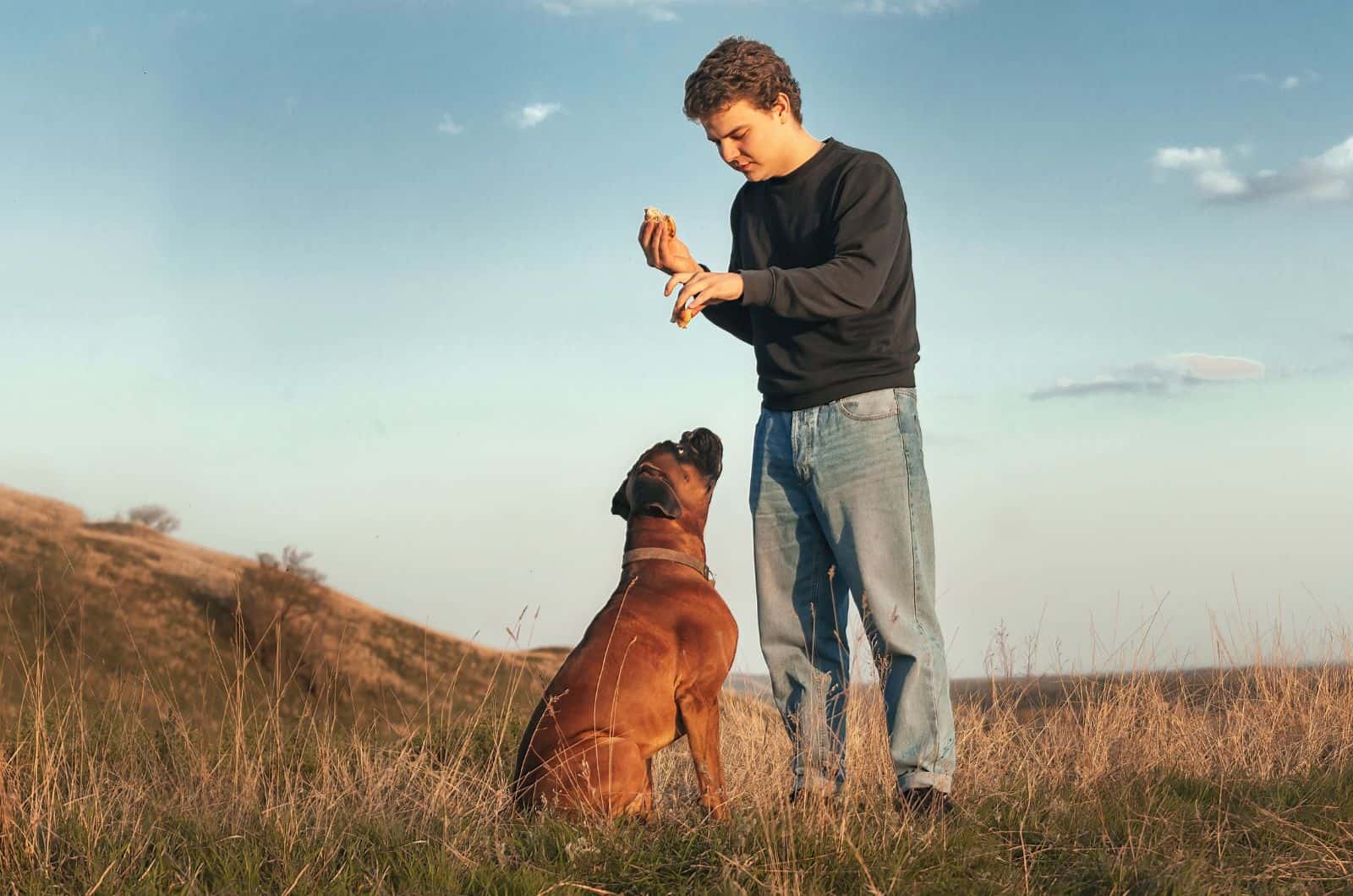
Different Boxer dog life stages require different food amounts.
Besides the life stage your Boxer dog is in, we should take into consideration that Boxers are medium-sized dogs, which means that they require a healthy diet that is specially designed for medium breed dogs.
Age
Earlier in this article we have mentioned that Boxer puppies need a special diet that consists of a higher percentage of protein, carbs, vitamins, and minerals. This is perfectly understandable because Boxer puppies need a healthy diet to grow. Additionally, Boxer puppies are always on the go and their bodies burn calories like crazy!
In contrast to young Boxer puppies, old Boxers need to be fed a healthy diet that has a lower content of protein and fat. Naturally, the metabolism of a Boxer dog slows with age. This means that a senior Boxer dog’s body burns fewer calories and requires less food to function properly.
So, due to the fact that many senior Boxer dogs are less energetic and more on the lazy side, they burn fewer calories. A slower metabolism is one of the main reasons why older Boxer dogs become obese because excess calories from high-calorie dog food are converted into fat.
Failure to feed a diet designed for the unique requirements of medium to large-breed puppies like the Boxer can lead to health issues such as canine arthritis, hip dysplasia, cardiomyopathy, and obesity. This is why you have to choose Boxer food that is designed to control the amount of calories and calcium consumed in order to reduce the risk of these health issues.
Gender
Regardless of the gender, all Boxer dogs need the right nutrients that will help them stay healthy and strong as they grow.
However, the nutritional needs of male Boxer dogs greatly differ from those of female Boxers.
Intact Male Boxer Dog
Intact male Boxer dogs are those that haven’t lost their family jewels! Research shows that intact male Boxer dogs eat more than their neutered counterparts. Which is pretty obvious due to the fact that intact male Boxer dogs go crazy when they show signs that they want to mate.
In fact, intact male Boxer dogs are known to roam and jump fences in order to get to their ladies. Roaming and chasing those female Boxer beauties burns away all the calories! So, intact male Boxer dogs are always hungry!
Neutered Male Boxer Dog
Upon reaching sexual maturity, intact male Boxer dogs often become restless and impossible to handle. This is the period when you can see signs that your male dog needs to be neutered.
Neutered male Boxer dogs have lower energy needs than their intact counterparts.
After having your Boxer dog neutered, you have to put it on a special diet to ensure a fast recovery. In fact, you will need to cut the food portion in half because neutered Boxer dogs require fewer calories.
If your neutered male Boxer dog starts to lose weight, you can reintroduce a gradual increase in food.
Intact Female Boxer Dog
Intact female Boxer dogs typically need fewer calories than both intact and neutered male dogs. Even though female Boxer dogs have a good appetite, their smaller size doesn’t support the same diet as that of a male Boxer dog.
Intact female Boxers that are fed the same diet as intact male Boxer dogs are more prone to obesity and heart problems.
Spayed Female Boxer Dog
Boxer dogs that have been spayed or neutered have lower levels of estrogens and androgens, which, just like in neutered male Boxer dogs, lowers their metabolic rate. Therefore, the spayed female Boxer dog requires less energy. After surgery, the appetite of a female Boxer dog might increase because estrogen has been shown to suppress hunger.
To ensure that your spayed female Boxer maintains a healthy body constitution and condition, the amount and type of food must be changed.
If you feed your spayed female Boxer the same diet as you would feed an intact female Boxer, then you’re in it for an overweight pooch.
Pregnant Female Boxer Dog
Once your female dog starts showing signs of pregnancy, get ready to learn more about what a feeding schedule for a pregnant pooch looks like.
It is best to provide your pregnant female Boxer dog with a nutritious diet that has 10% more energy each week until delivery.
Start by offering your pregnant Boxer dog smaller and more frequent meals rather than large portions. Pregnant Boxers will have less space in their tummy for large amounts of food so make sure to keep the balance between small meals.
In general, food for pregnant Boxer dogs should contain a minimum of 29% protein and 17% fat. Additionally, her diet should consist of a lot of soluble carbohydrates along with a little fiber.
But, that’s not all! One of the most crucial minerals for pregnant Boxer dogs are calcium and phosphorus. These minerals support healthy bone development of unborn Boxer puppies.
Activity Levels
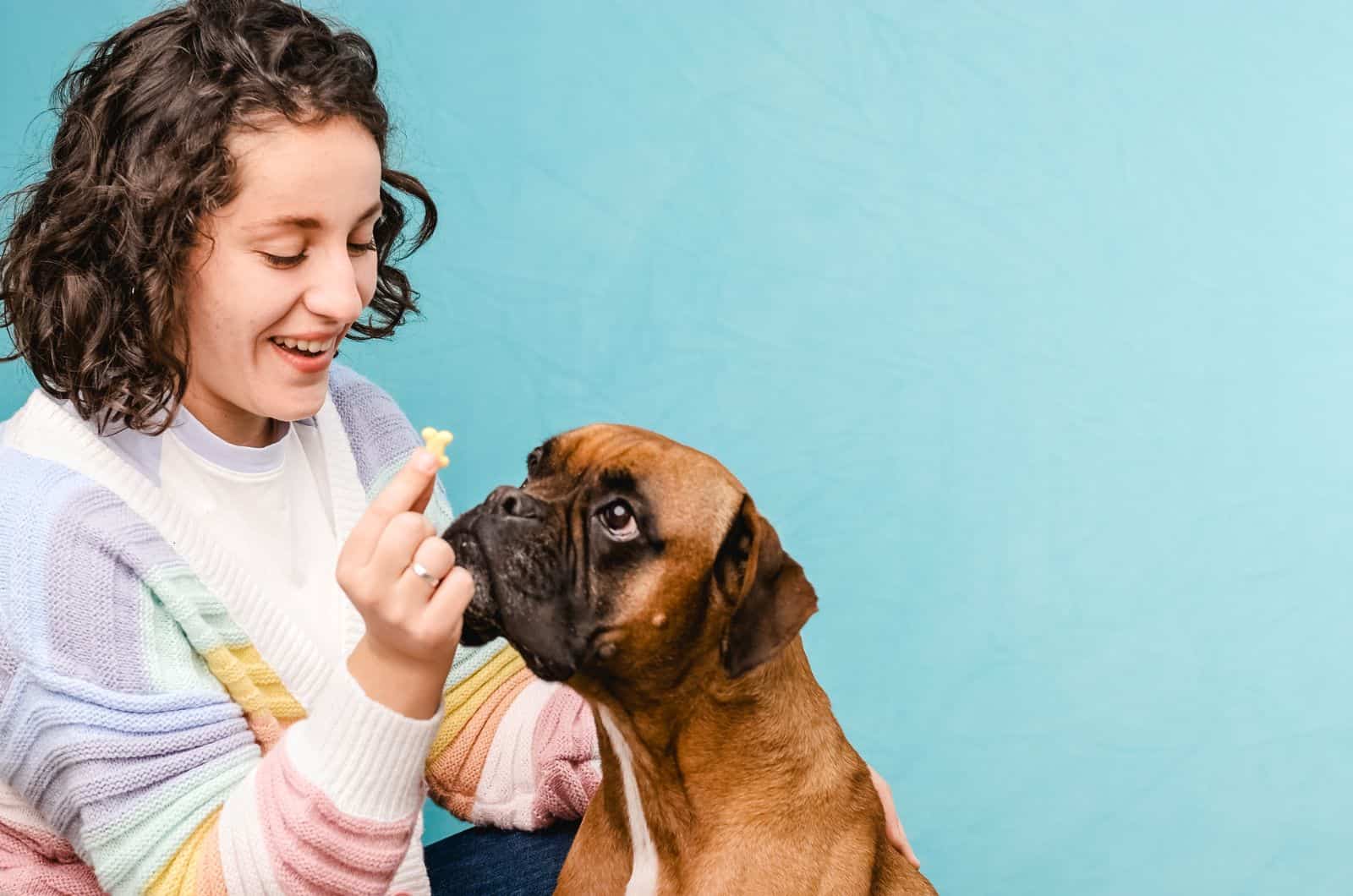
Boxer puppies, adolescents, and young adult dogs that are in perfect heath have insane energy levels! This means that their activity levels are high and they need regular exercise.
When your Boxer pup runs all over the place, it needs a lot of nutritious food to feed those muscles!
Active Boxer Dogs
Feeding your Boxer dog food with a guaranteed level of protein of 26% or higher is recommended to help support its high activity levels. Boxer dogs that receive these optimal levels of dietary protein are more likely to perform to their full potential.
Besides healthy protein intake, active Boxer dogs need a bit of carbohydrates. Carbs play an important role in a Boxer dog’s diet because they provide energy in the form of glucose that gets the body going!
It is best to adjust your feeding amount long term based on your Boxer dog’s overall health and weight. If you notice that your Boxer dog is gaining more weight, simply feed it less, and if they are becoming underweight, feed more.
Lazy Boxer Dogs
Adult Boxer dogs differ from one to another and have different activity levels.
While active adult Boxer dogs normally active require 30 calories per pound of body weight, lazy Boxer dogs require less calories per day to maintain their overall health and avoid becoming obese.
Senior Boxer Dogs
The majority of senior Boxer dogs frequently prefer canned or raw food over dry dog food. Maybe it is because their teeth are not as strong as before, or simply because of the added moisture found in canned dog food.
Even though senior Boxer dogs tend to eat less because they are less active and have slower metabolisms, they require dog food that is high in energy, antioxidants, and fatty acids. These compounds do wonders for senior Boxer dogs’ joints and immune system.
This is why senior dog food for Boxers features a healthy balance of antioxidants and fatty acids.
Senior Boxer dogs typically prefer smaller portions that are given more frequently throughout the day rather than two fully loaded bowls a day.
What Foods Should Boxers Avoid?
As we mentioned in the grain-free diet part, Boxer dogs should avoid any dog food that contains wheat, corn, or soy. These ingredients are merely fillers for your Boxer dog, offering little to no nutritional value. In fact, the majority of food allergies in dogs are triggered by grains such as wheat and corn.
Besides these common dog food ingredients, Boxer dogs should avoid human food like chocolate, macadamia nuts, milk, avocado, candy, and spicy food.
Cooked bones should never be given to Boxer dogs. Cooked chicken or beef bones are breakable and may cause damage to your Boxer’s digestive system. If a broken bone gets stuck in your Boxer’s esophagus, it will vomit white foam in effort to get rid of the bone.
So, when cooking bone broth for your Boxer dog, make sure to get rid of all cooked bones.
Boxer dogs are known to have sensitive stomachs. If your Boxer dog ingests food that is toxic to its digestive system, chances are that it will throw up yellow or develop diarrhea.
It is best to consult with your veterinarian and go over any worries you have about what foods your Boxer dog should avoid.
Why Is My Boxer Always Hungry?
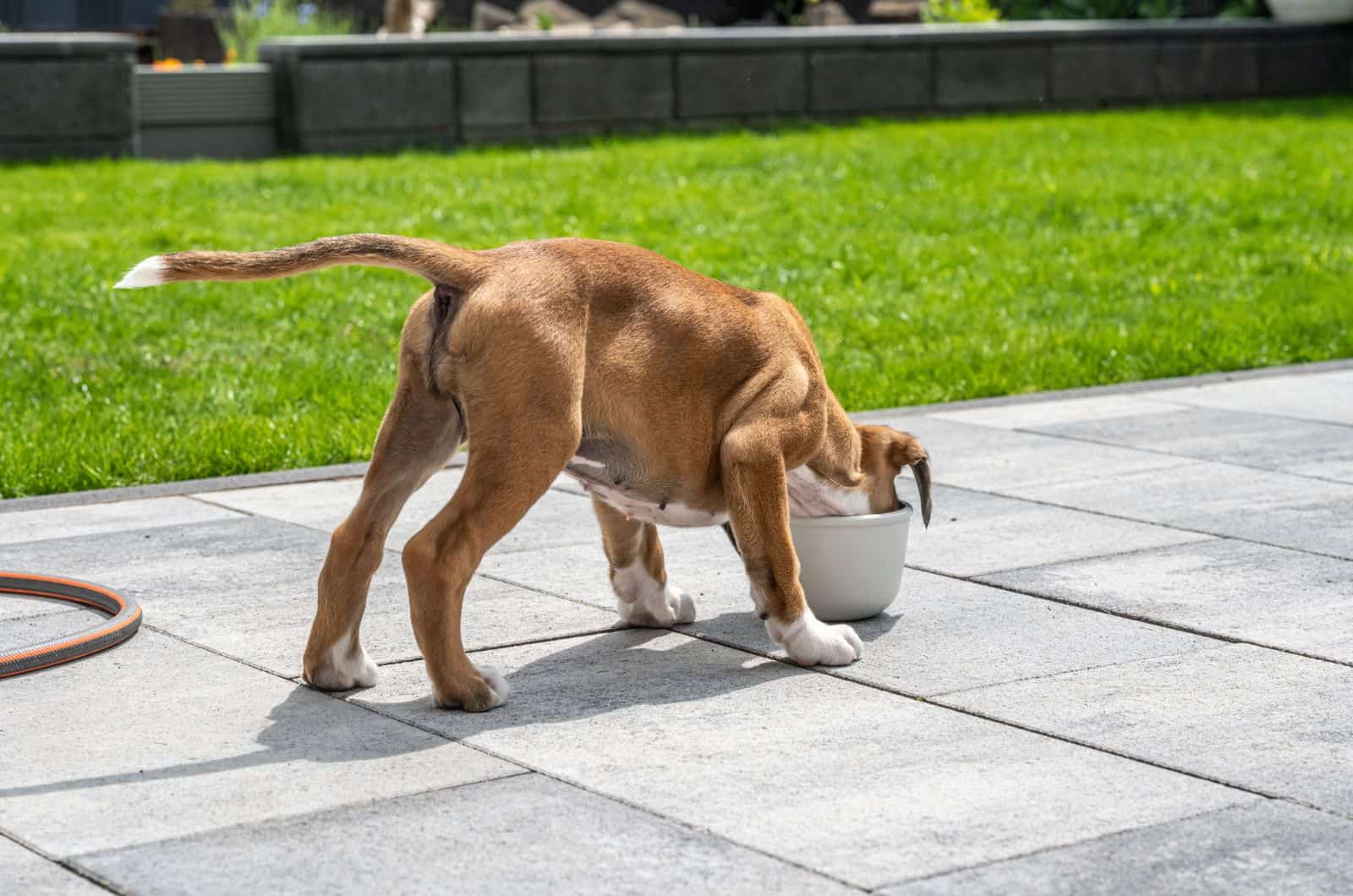
While many Boxer dogs simply have an insane desire for food, an increased appetite (also known as polyphagia) can also indicate a number of health problems.
For example, Boxers with diabetes often show signs of polyphagia or an insatiable appetite. These can be signs that your senior dog with diabetes is dying.
Besides health issues and all that serious stuff, Boxer dogs can simply inherit a faster metabolism which makes them always hungry. They’re always active, so it’s pretty normal for the majority of Boxer dogs to appear constantly hungry.
Why Won’t My Boxer Puppy Eat?
Owners are understandably worried when their Boxer pup abruptly stops eating or gradually loses interest in food.
In the absence of other symptoms of health issues, a Boxer not eating is typically not a cause for concern. Normally, stress, reaction to medication, and changes in their environment, can all cause a Boxer pup to stop eating.
Boxer puppies that are in their teething period like to nibble on people or objects, rather than consuming their puppy food. Some Boxer pups experience severe discomfort and pain while teething which reduces their will to eat.
A Boxer puppy may frequently stop eating due to intestinal parasitic infestation or infections that cause upset stomach.
The lack of appetite in Boxer puppies could be a sign of a serious issue like a blockage or poisoning. In other cases, Boxer dogs can lose their appetite due to internal obstructions, pain, and dental issues.
What Is The Best Food For Boxers?
The best food for your Boxer dog is usually food that is made for active dogs. While most Boxer owners prefer the Royal Canin brand, there are other commercial dog foods across the U.S. that are high in quality.
The majority of Boxer dogs inherit a sensitive stomach, so it is best to avoid bad food brands and to consult your veterinarian about the best dog food that you can find.
Conclusion
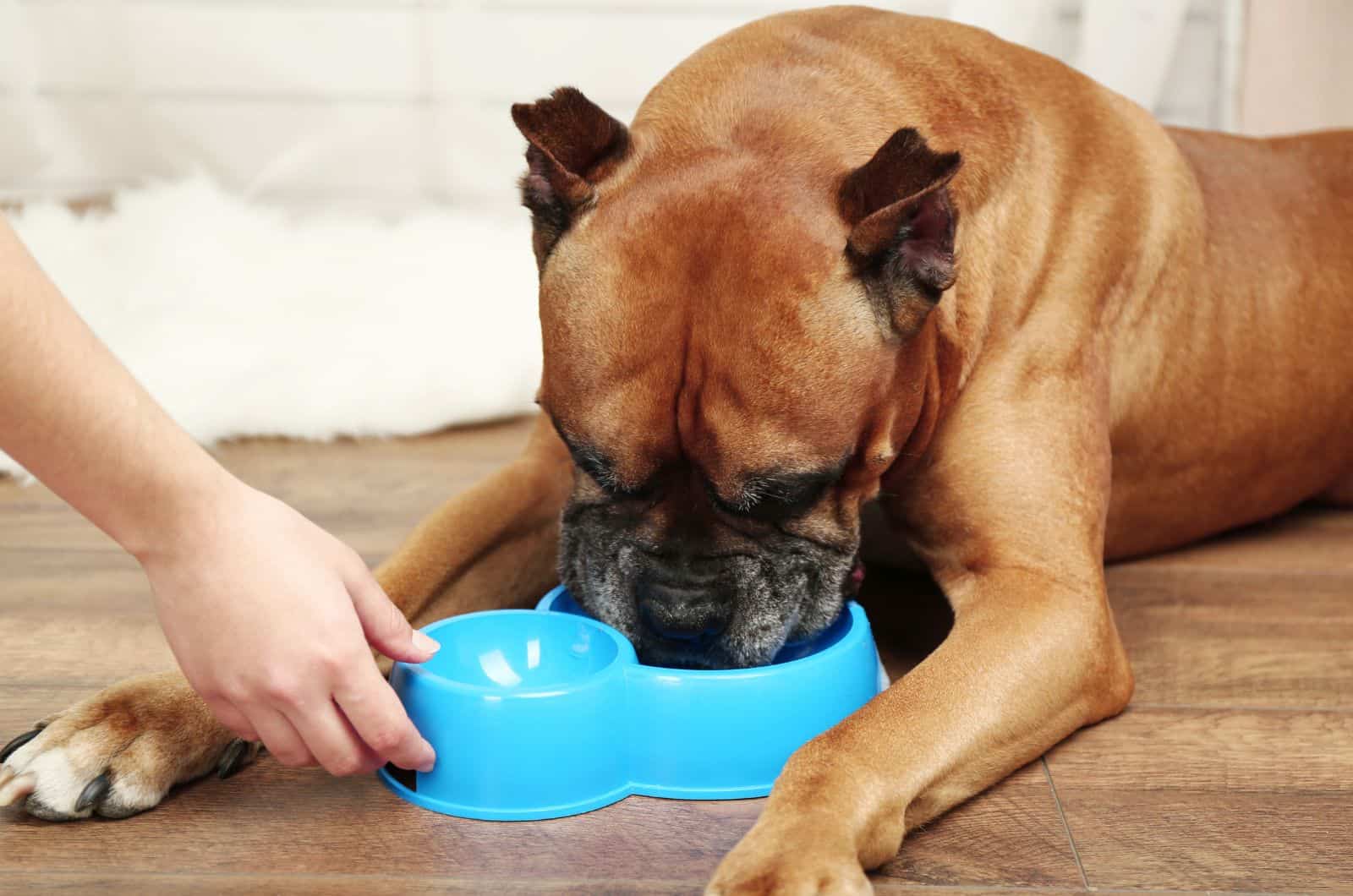
Give your hungry Boxer pooch all the nutrients they need to stay healthy and live a long life! The best way to keep a Boxer pup happy is by giving it nutritious food and lots of exercise.
This Boxer feeding chart explains how much food a Boxer needs based on its activity levels. So, I believe that you have gotten the hang of this feeding guide!
Reputable Boxer breeders offer information about their puppy’s diet and most include puppy food samples with feeding instructions. Make sure to ask your Boxer breeder for additional tips and tricks.
Even though this Boxer feeding chart answers the most common questions about Boxer diet and feeding schedule, in case your Boxer puppy is showing signs of health issues, call your veterinarian for a check-up.
Related Content
Why Do Dogs Eat Cat Poop: 6 Reasons And How To Stop It
